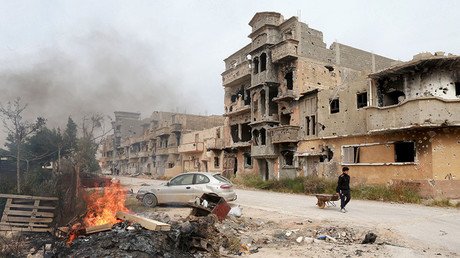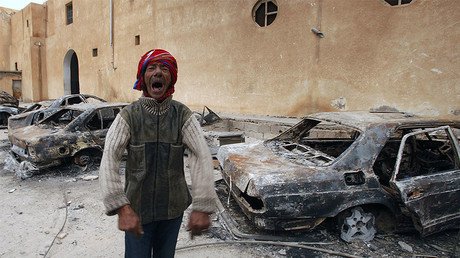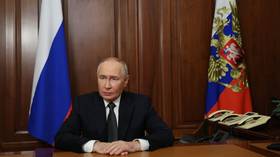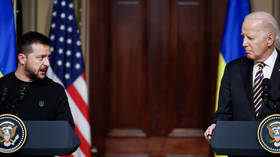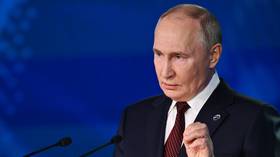Lifting Libyan arms embargo is ‘premature’ – Russia’s acting UN envoy
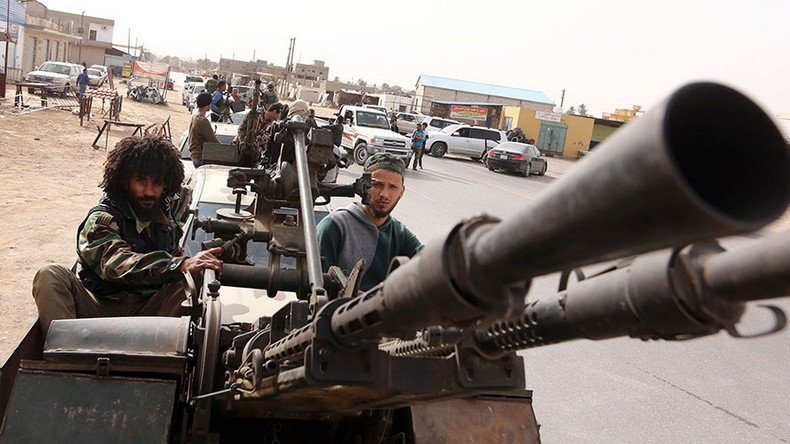
The “uncertain” political situation as well as a dire security situation in Libya make any proposals concerning the full or even partial lifting of the arms embargo imposed against the nation “premature,” Russia’s incumbent UN envoy, Pyotr Ilyichev, said.
“Given the uncertainty of the situation in Libya, it would be premature to talk about a full or partial lifting of the weapons embargo [imposed] against Libya,” Ilyichev said at the UN Security Council meeting dedicated to the country’s crisis.
He went on to say that any proposals should be “strictly linked” to the security situation in the North African country. More than six years after the start of the Arab Spring, Libya “is still going through a painful recovery” from a heavy blow dealt to it by international intervention and the toppling of its former leader, Muammar Gaddafi, the Russian envoy said.
Last year, western powers, including the US, considered partially lifting the embargo to help the UN-backed government in Tripoli tackle security challenges in the war-torn state.
Ilyichev expressed his regret over the fact that, “despite the efforts undertaken by the international community to settle the Libyan crisis, the situation [there] is not changing for the better” and expressed Moscow’s concern over the fact that “the fragmentation of government” still “impedes the resolution of numerous issues in the area of security and the social economic area.”
He particularly drew attention to the fact that Libya is still divided between a Tobruk-based parliament and the UN-backed unity government in Tripoli, which are still engaged in a bitter confrontation that had led to a “paralysis of the government system.”
22 migrants killed, 100 injured as smugglers battle for supremacy in Libya’s power vacuum https://t.co/UNlVo3aubL
— RT (@RT_com) 8 марта 2017 г.
The two centers of power particularly failed to fully implement the provisions of the UN-backed agreement they signed in December 2015, Ilyichev said, adding that the main goal of that deal has not been achieved so far as the “text of the constitution has not been finalized and the general elections have not taken place.”
He went on to say that the UN-backed unity government is still “unable to significantly broaden its support and become a power body that is trusted by everyone in the country” and cannot even take control over the Libyan capital of Tripoli, which is still “controlled by many armed groups, not all of which are loyal to the [authorities].”
“The composition of the Government of the National Accord still has not been endorsed by the [Tobruk-based] House of Representatives as the UN-supported agreements require,” he said as the legislative body voted to denounce the 2015 UN-backed treaty in March.
The Russian envoy also questioned the goals behind the process of establishing the so-called Libyan Presidential Guard by saying that it is “unclear how the creation of this structure relates to the key issue of creation of a unified security apparatus.”
At the same time, he called on the international community and Libyan political forces not to “marginalize” the Libyan National Army, which could still form a “basis for the creation of the future unified armed forces” of Libya and become a reliable partner for the international community dealing in the security issues.
In the meantime, the political and security “vacuum” in Libya is used by terrorist groups, such as Islamic State (IS, former ISIS/ISIL) and Al Qaeda that continue to build their presence in some Libyan regions and support local extremist groups linked to them, Ilyichev said. He pointed out that the disastrous security situation in the country could also constitute a broader terrorist threat for the region as the ongoing counterterrorism activities only force the extremists to move to other parts of the country and create sleeper cells.
READ MORE: African migrants raped & murdered after being sold in Libyan ‘slave markets’ – UN
“The negative impact of the situation in Libya is… felt in Europe as well” as it “has to deal with the waves of illegal migrants, who are trying to move over to the European continent and do it through the Libyan territory,” the Russian envoy added.
He then said that those who genuinely seek to restore peace and stability in Libya should avoid any one-sided approaches and criticized the countries that “pit some Libyans against others” by supporting Tripoli in its struggle against Tobruk by saying that they are “making a mistake.”
“We should not leave anyone behind as it is done by the western countries when they introduce unilateral sanctions,” he said, adding that such “one-sided approaches are the reasons why the political process [in Libya] has stalled."
